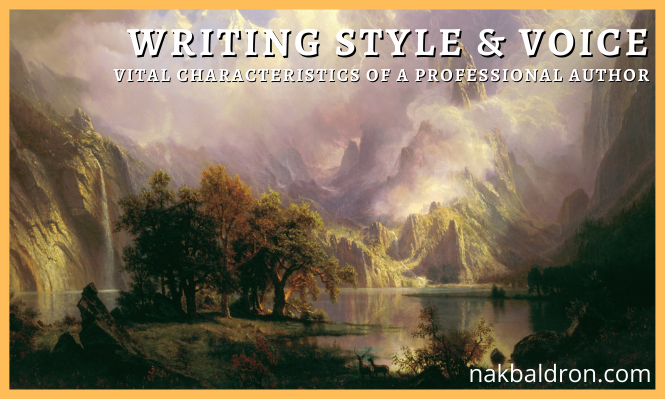A strong writing style and voice is an essential aspect of being a professional author. Your writing style is the way you use words, phrases, and sentence structure to convey your ideas and emotions, while your voice is the unique perspective and personality that you bring to your writing.
Having a strong writing style and voice can help your writing stand out and make it more engaging and enjoyable for readers. It can also help to establish you as a distinct and recognizable author. A strong writing style and voice are developed through practice, reading, and study, as well as by finding your own unique way of expressing yourself.
Practice:
Writing practice refers to the habits and routines that authors engage in to improve their writing skills and productivity. These can include setting aside dedicated writing time, setting goals and deadlines, using writing prompts or exercises, maintaining a writing schedule, keeping a journal or writing diary, and seeking feedback from others. Engaging in regular writing practices can help authors develop their craft, improve their writing skills, and stay motivated and productive.
Reading:
Reading is an important practice for authors, as it can help them improve their writing skills, gain inspiration and ideas, and stay informed about the latest trends and developments in their field. Reading widely and diversely can expose authors to different writing styles, techniques, and perspectives, which can help them expand their knowledge and skills as a writer. Reading can also help authors stay motivated and inspired, as well as provide them with a source of relaxation and enjoyment. Overall, reading is an essential part of being an author, and should be an ongoing and integral part of an author’s practice and development.
Study:
As an author, it is important to continuously study and learn about the craft of writing, as well as about one’s chosen genre and subject matter. This can involve reading books and articles about writing techniques, attending writing workshops and seminars, participating in writing groups or communities, and seeking out mentors or other experienced writers to learn from. Studying as an author can help writers improve their skills, expand their knowledge, and stay up-to-date on the latest developments and trends in the writing industry. It is an ongoing process that should be an integral part of an author’s practice and development.
Why:
It is important for professional authors to continuously work on developing their writing style and voice, as it can evolve and grow over time. This can involve experimenting with different styles and techniques, seeking feedback from other writers and readers, and continually challenging oneself to improve.
Having a strong writing style and voice can also involve finding the right balance between being true to oneself and one’s unique perspective, while also being aware of and considering the needs and preferences of one’s audience. Ultimately, a strong writing style and voice is an essential element of creating compelling and engaging writing that resonates with readers.
Your voice is the unique perspective, style, and tone that you bring to your writing, and it sets you apart from other writers. But finding your voice can be a difficult and sometimes intimidating process. Anne Lamott, in her book Bird by Bird, encourages writers to embrace their flaws and imperfections, and to write from a place of honesty and vulnerability. She advises writers to start small, with short assignments or “shitty first drafts,” and to be patient with the process of writing and revising.
One way to find your voice is to write what you know and are passionate about. This can help your writing feel authentic and genuine, and will allow you to bring your own experiences and insights to your work. It’s also important to be open to experimentation and to try new things in your writing. This can help you discover what works for you and what doesn’t, and can lead you to new and unexpected places in your writing.
Another way to develop your voice is to read widely and pay attention to the writing styles of other authors that you admire. This can help you identify the elements of their writing that you find compelling and inspiring, and can give you ideas for how to incorporate those elements into your own work.
Ultimately, finding your voice as a writer is about being true to yourself and your unique perspective. It’s about being brave enough to take risks and to share your thoughts and feelings with the world. Lamott reminds us that the process of finding our voice is an ongoing one, and that it’s okay to make mistakes and to learn from them. With practice and persistence, you can find and develop your own unique voice as a writer.
“The Sound on the Page” is a book by Ben Yagoda that explores the elements of style and voice in writing. The book is divided into three main sections: “Voice,” “Style,” and “Usage.”
In the “Voice” section, Yagoda discusses the importance of developing a distinct and authentic voice as a writer. He advises writers to be true to themselves and to find their own unique way of expressing themselves on the page. He also covers topics such as tone, point of view, and character development, and he offers tips on how writers can use these elements to create a strong and engaging voice in their writing.
The “Style” section of the book focuses on the technical aspects of writing, such as sentence structure, grammar, and word choice. Yagoda discusses the various options available to writers and how to choose the right tools for the job, and he offers practical tips on how to improve one’s writing style.
In the final section, “Usage,” Yagoda covers common usage issues that writers may encounter, such as spelling, punctuation, and word choice. He also offers guidance on how to write for different audiences and how to adapt one’s style to different contexts.
Throughout the book, Yagoda uses examples from a variety of writers and writing styles to illustrate his points, and he provides exercises and prompts to help readers practice and apply what they have learned.
Overall, “The Sound on the Page” is a comprehensive and informative guide to style and voice in writing. It is an essential resource for writers at all levels who are looking to improve their writing skills and find their own unique voice.
Become a member of Aconite Café’s Writer Tribe Patreon and join an exclusive Discord community where you can connect with like-minded writers and take your craft to the next level. Every week, I host a voice chat where I present a thought-provoking topic and answer your questions to help you deepen your understanding and improve your marketing and writing skills.
Don’t miss out on this opportunity to be part of a supportive and dynamic writing community – join today and start reaching your full potential as a writer!





